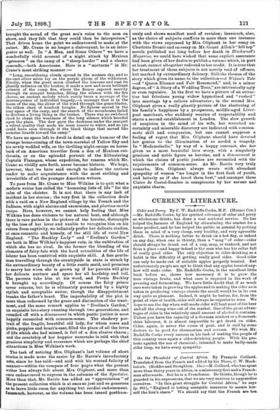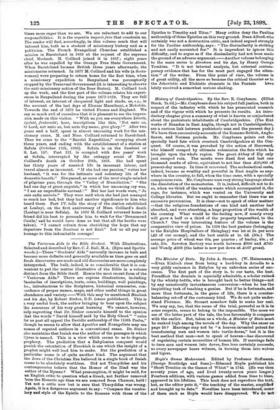On the Threshold of Central Africa. By Francois Coillard. Translated
from the French and edited by his Niece, C. W. Mack- intosh. (Hodder and Stoughton. 15s.)—M. Coillard, who has spent more than thirty years in Africa, is a missionary first and a French- man afterwards. But he is a Frenchman. He thinks, though he is guarded in his expressions, that we are very anxious to aggrandise ourselves. "In this great struggle for Central Africa," he says (p. 381), "England is taking energetic measures to assure her- self the lion's share." We should say that the French are ten times more eager than we are. We are reluctant to add to our responsibilities. It is the urgentia imperii fate that constrain us. The reader will find, accordingly, in this volume much that will interest him, both as a student of missionary history and as a politician. The French Evangelical Churches established a mission in Basutoland in 1833 at the request of the supreme chief, Moshesh. M. Coillard joined it in 1857; eight years after he was expelled by the Orange Free State Government. When Basutoland became British three years afterwards, the missionaries returned. In 1877 M. Coillard and his wife (a Scots- woman) were preparing to return home for the first time, when a missionary expedition to Banyailand was peremptorily stopped by the Transvaal Government (it is interesting to observe the anti-missionary action of the Boer States). M. Coillard took up the work, and the first part of the volume relates his experi- ences in Banyailand during the years 1877-1879. They are full of interest, an interest of chequered light and shade, as, e.g., in the account of the last days of Eleazar Marathani, a Mokololo. Towards the end of 1879 he visited France and England. We say so much evil of ourselves that it is pleasant to see the impres- sion made on this visitor. "With us you see everywhere Liberte; egalite, fraternitd ; hero, inscriptions like this, 'Not unto us, 0 Lord, not unto us, but unto thy name, give glory.'" After two years and a half, spent in almost unceasing work for the mis- sionary cause, M. and Mme. Canard returned to Basutoland. Thus we come to the " Barotsi Expedition," occupying about three years, and ending with the establishment of a station at Sefula (October 11th, 1886). Sefula is on the Zambesi or S. Lat. 15?. Part III. is occupied with five years' work at Sefula, interrupted by the unhappy event of Mme. Coillard's death on October 28th, 1891. She had spent her thirty years of married life in incessant labour, and travel almost as incessant. "If she bad one passion," writes her husband, "it was for the intimate and sedentary life of the domestic hearth." She passed, as some of the most single-minded of pilgrims pass, through the "Valley of Humiliation." "She had one day of great anguish," in which her unceasing cry was, "I am an unprofitable servant !" But her last words were," Je suis enfin arrivoe." They were said when she had just managed to reach her bed, but they had another significance to him who heard them. Part IV. tells the story of the station established at Lealuyi, on the first anniversary of Mme. Coillard's death (Lealuyi is near Sefula). In 1896 M. Coillard returned home (a friend did his best to persuade him to wait for the Drummond Castle,' and he would have done so but that all the berths were taken). "I cannot refrain from cherishing the hope that ray departure from the Zambesi is not finaL" Let us all pay our homage to this indomitable courage !



































 Previous page
Previous page